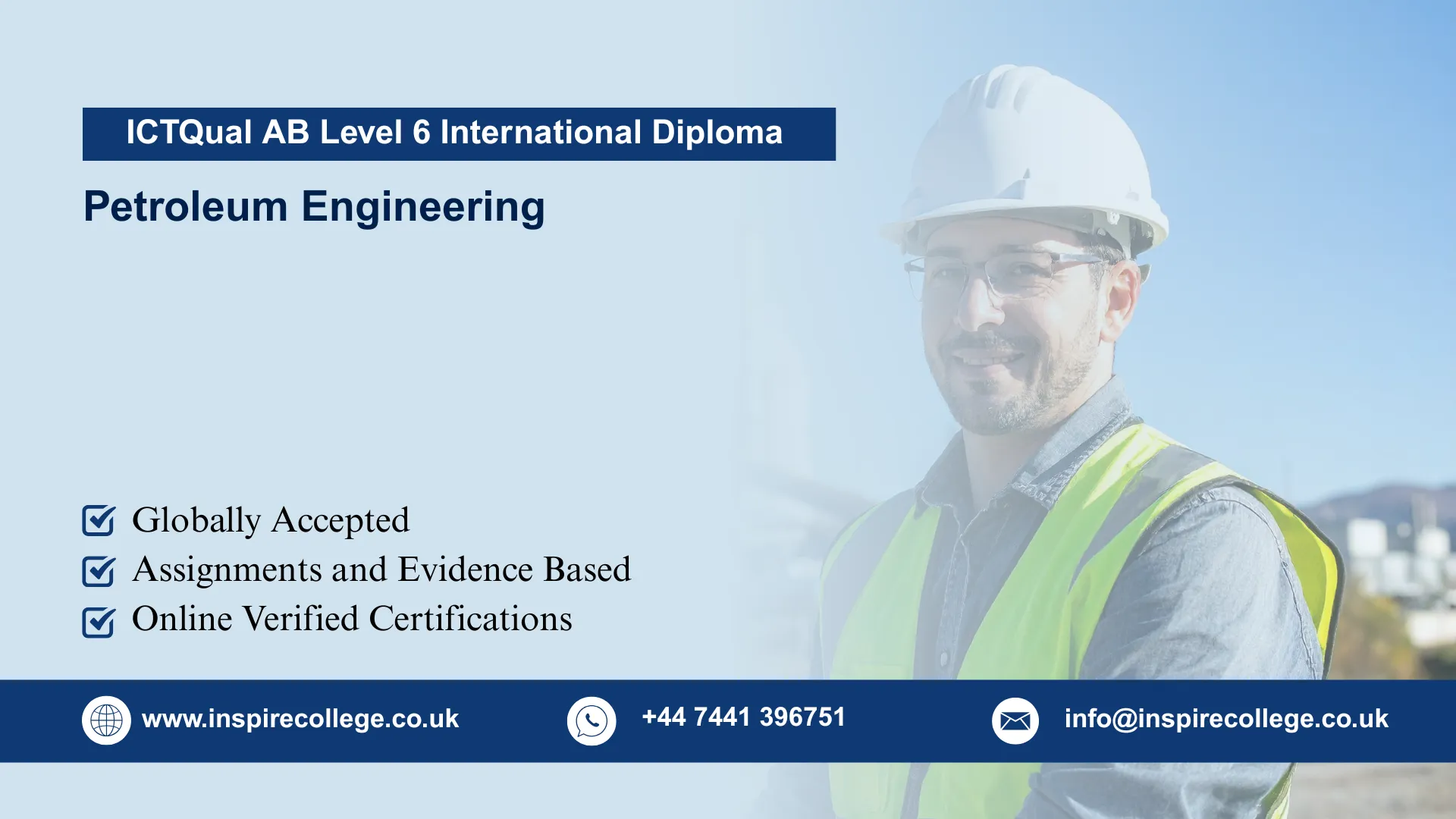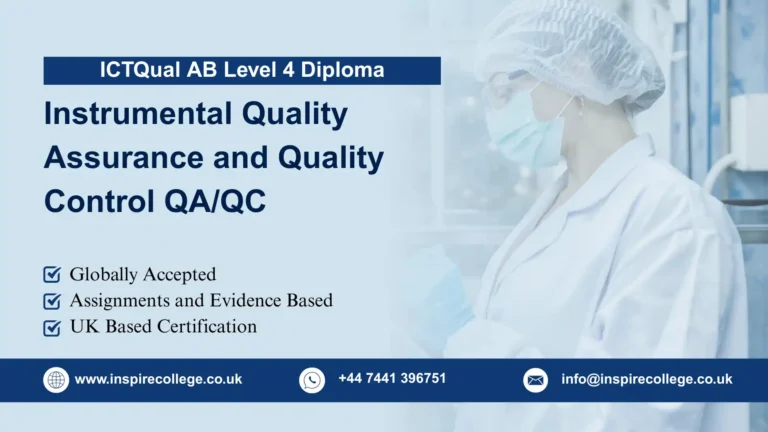
ICTQual AB Level 6 International Diploma in Petroleum Engineering
The ICTQual AB Level 6 International Diploma in Petroleum Engineering is an advanced, internationally recognized qualification designed to equip learners with the essential skills, knowledge, and practical expertise required in the dynamic oil and gas industry. Petroleum engineering remains a critical field, powering global energy demands, supporting industrial development, and driving technological innovation. This diploma offers learners a comprehensive pathway to excel in exploration, drilling, production, and reservoir management, making it highly relevant for both fresh graduates and experienced professionals.
This three-year program, comprising 360 credits, provides a structured and in-depth curriculum covering the fundamental, intermediate, and advanced aspects of petroleum engineering. Learners will gain a strong foundation in drilling engineering, reservoir characterization, production technology, petroleum geoscience, and energy project management. The course also integrates practical applications such as field simulations, technical project work, and industry-standard software tools, ensuring learners can translate theoretical knowledge into real-world solutions.
Graduates of this program will develop critical skills in problem-solving, data analysis, project planning, and risk management, preparing them for professional roles in upstream and downstream petroleum operations. Additionally, the curriculum emphasizes safety, environmental sustainability, ethical practices, and compliance with international regulations, enabling learners to operate responsibly in complex energy environments.
By enrolling through our approved ICTQual AB centre, learners benefit from expert guidance, structured assessments, and access to a globally recognized Level 6 qualification. Upon completion, graduates will be fully equipped to pursue careers as petroleum engineers, drilling specialists, reservoir engineers, energy project managers, or consultants in the oil and gas sector, and to contribute to innovative and sustainable energy solutions worldwide.
To enrol in the ICTQual AB Level 6 International Diploma in Petroleum Engineering, learners must meet specific entry criteria to ensure they are prepared for advanced technical study in oil and gas engineering. These requirements accommodate both fresh graduates and experienced professionals seeking to develop expertise in petroleum exploration, drilling, production, and reservoir management
1. Age Requirements
- Learners must be 18 years or older at the time of enrolment
- Candidates under 18 may be considered on a case-by-case basis if other entry criteria are met
2. Educational Requirements
- Minimum high school or secondary school completion with strong foundations in physics, chemistry, mathematics, or engineering-related subjects
- For candidates without formal qualifications, relevant vocational or technical training in petroleum, energy, or mechanical engineering may be considered
- Related courses include the ICTQual AB Level 5 Diploma in Oil & Gas Engineering or Level 5 Diploma in Mechanical Engineering, which provide a foundational pathway to Level 6 study
3. Professional Experience
- Professionals with at least 3–6 years of verifiable experience in petroleum engineering, oilfield operations, drilling, or related roles may qualify for a fast-track, experience-based entry route
- Experience must be documented with employment records, project reports, or professional references
- Fresh candidates without prior experience are required to complete the full 3-year, 360-credit program, including all assignments and assessments
4. English Language Proficiency
- Learners whose first language is not English must demonstrate English proficiency, equivalent to IELTS 5.5–6.0 or TOEFL iBT 60–70
- Competency in reading, writing, listening, and speaking is required to successfully complete technical assignments, projects, and assessments
Meeting these entry requirements ensures learners are fully prepared to engage with advanced petroleum engineering concepts, practical applications, and industry-standard techniques. Enrolling through our approved ICTQual AB centre provides mentorship, resources, and guidance, enabling learners to achieve a globally recognized Level 6 qualification and advance their careers in the oil and gas sector
Mandatory Units
This qualification, the ICTQual AB Level 6 International Diploma in Petroleum Engineering 360 Credits – Three Years, consists of 36 mandatory units.
Year 1 – Foundation in Petroleum Engineering
- Principles of Petroleum Engineering
- Engineering Mathematics
- Fundamentals of Mechanical and Electrical Engineering
- Introduction to Petroleum Geology
- Drilling Engineering Fundamentals
- Engineering Drawing and Computer-Aided Design (CAD)
- Basics of Reservoir Engineering
- Well Logging and Formation Evaluation
- Health, Safety, and Environmental Practices in Petroleum Engineering
- Communication and Technical Report Writing
- Introduction to Project Management in Engineering
- Introduction to Oil & Gas Industry Operations
Year 2 – Intermediate Studies in Petroleum Engineering
- Advanced Drilling and Well Control
- Reservoir Rock and Fluid Properties
- Production Engineering and Well Completion
- Petroleum Facilities and Pipeline Engineering
- Applied Thermodynamics and Fluid Mechanics
- Petroleum Project Planning and Management
- Oil & Gas Exploration Techniques
- Enhanced Oil Recovery Methods
- Industrial Maintenance and Reliability in Petroleum Operations
- Applied Research Methods in Petroleum Engineering
- Sustainable Practices and Environmental Management in Petroleum
- Oil and Gas Economics and Cost Control
Year 3 – Advanced Studies in Petroleum Engineering
- Advanced Reservoir Simulation and Modelling
- Petroleum Production Systems and Optimisation
- Offshore and Subsea Engineering
- Advanced Drilling Technology and Well Intervention
- Advanced Fluid Flow and Multiphase Systems
- Petroleum Safety, Risk, and Quality Management
- Smart Technologies and Industry 4.0 in Oil & Gas
- Robotics and Automation in Petroleum Operations
- Cyber-Physical Systems and IoT in Petroleum Engineering
- Professional Ethics and Sustainability in Petroleum Engineering
- Innovation and Entrepreneurship in Oil & Gas Technology
- Final Year Major Project (Capstone Project)
The ICTQual AB Level 6 International Diploma in Petroleum Engineering equips learners with advanced technical knowledge, practical skills, and strategic expertise required for successful careers in the oil and gas sector. Graduates will gain the ability to plan, implement, and optimize petroleum engineering operations while adhering to industry standards, safety protocols, and sustainable practices.
Year 1 – Foundation in Petroleum Engineering
1. Principles of Petroleum Engineering
- Understand the fundamentals of petroleum exploration, drilling, and production processes
- Apply basic engineering concepts to petroleum operations and workflows
- Evaluate the role of petroleum engineering in global energy supply
2. Engineering Mathematics
- Develop mathematical skills for problem-solving in petroleum engineering scenarios
- Apply calculus, algebra, and statistical methods to analyze engineering data
- Utilize mathematical models to predict operational outcomes
3. Fundamentals of Mechanical and Electrical Engineering
- Understand mechanical and electrical principles applied to oilfield equipment
- Analyze mechanical systems and electrical circuits in petroleum operations
- Apply knowledge to troubleshoot and maintain engineering systems
4. Introduction to Petroleum Geology
- Understand geological formations, rock types, and sedimentary structures
- Apply geoscience principles to exploration and reservoir identification
- Interpret geological data for decision-making in drilling and production
5. Drilling Engineering Fundamentals
- Learn the principles of drilling operations and rig systems
- Apply drilling techniques to design well paths and optimize operations
- Evaluate drilling efficiency and safety protocols
6. Engineering Drawing and Computer-Aided Design (CAD)
- Create accurate technical drawings for petroleum engineering projects
- Apply CAD tools for designing well layouts, pipelines, and facilities
- Interpret engineering diagrams for operational planning
7. Basics of Reservoir Engineering
- Understand reservoir characteristics, pressure, and fluid dynamics
- Apply reservoir modeling techniques to predict production performance
- Analyze reservoir data for decision-making in well placement and production
8. Well Logging and Formation Evaluation
- Interpret well logs and geological data for formation evaluation
- Apply logging tools and techniques to assess reservoir properties
- Make informed decisions on well design and production strategies
9. Health, Safety, and Environmental Practices in Petroleum Engineering
- Understand safety protocols, risk assessment, and hazard management
- Apply environmental protection and sustainability principles
- Promote safe and responsible operations in petroleum projects
10. Communication and Technical Report Writing
- Develop professional writing and presentation skills for technical documentation
- Prepare reports on engineering analyses, projects, and field studies
- Communicate effectively with teams, stakeholders, and regulatory authorities
11. Introduction to Project Management in Engineering
- Understand project planning, scheduling, and resource allocation
- Apply project management techniques to petroleum operations
- Monitor project performance and ensure timely delivery
12. Introduction to Oil & Gas Industry Operations
- Gain insights into upstream, midstream, and downstream operations
- Understand the structure, processes, and stakeholders in the oil and gas industry
- Evaluate operational workflows and industry best practices
Year 2 – Intermediate Studies in Petroleum Engineering
1. Advanced Drilling and Well Control
- Apply advanced drilling techniques for safe and efficient operations
- Implement well control measures to prevent blowouts and operational risks
- Analyze drilling data to optimize performance and safety
2. Reservoir Rock and Fluid Properties
- Understand rock mechanics and fluid properties in reservoirs
- Apply petrophysical analysis to evaluate reservoir performance
- Use laboratory and field data to support production strategies
3. Production Engineering and Well Completion
- Design and optimize well completions for efficient production
- Apply production engineering principles to surface and subsurface systems
- Evaluate production data for performance improvement
4. Petroleum Facilities and Pipeline Engineering
- Understand design and operation of petroleum facilities and pipeline systems
- Apply engineering principles for transportation, storage, and distribution
- Monitor facility performance and ensure operational safety
5. Applied Thermodynamics and Fluid Mechanics
- Apply thermodynamic principles to petroleum processes and systems
- Analyze fluid flow, pressure, and temperature effects in wells and pipelines
- Use modeling techniques to optimize engineering operations
6. Petroleum Project Planning and Management
- Plan and manage petroleum projects from concept to execution
- Apply risk assessment, budgeting, and scheduling techniques
- Evaluate project performance for continuous improvement
7. Oil & Gas Exploration Techniques
- Understand exploration methods, including seismic, geophysical, and geochemical techniques
- Interpret exploration data for reservoir identification and development
- Apply exploration insights to strategic decision-making
8. Enhanced Oil Recovery Methods
- Learn advanced techniques to improve hydrocarbon recovery
- Apply chemical, thermal, and gas injection methods
- Evaluate the efficiency and cost-effectiveness of recovery operations
9. Industrial Maintenance and Reliability in Petroleum Operations
- Implement maintenance strategies to optimize equipment reliability
- Monitor system performance and prevent operational downtime
- Apply reliability engineering principles to petroleum facilities
10. Applied Research Methods in Petroleum Engineering
- Conduct research using quantitative and qualitative methods
- Analyze data to solve practical engineering problems
- Prepare technical reports and presentations for research findings
11. Sustainable Practices and Environmental Management in Petroleum
- Implement sustainable practices in petroleum operations
- Evaluate environmental impact and compliance with regulations
- Develop strategies to minimize ecological footprint
12. Oil and Gas Economics and Cost Control
- Understand economic principles and cost management in petroleum projects
- Analyze budgets, forecasts, and financial performance
- Apply economic evaluation to optimize investment and operational decisions
Year 3 – Advanced Studies in Petroleum Engineering
1. Advanced Reservoir Simulation and Modelling
- Use computational tools to simulate reservoir behavior
- Predict production performance and optimize recovery strategies
- Analyze simulation results to support decision-making
2. Petroleum Production Systems and Optimisation
- Design and manage production systems for maximum efficiency
- Apply optimization techniques for wells, facilities, and pipelines
- Evaluate performance metrics and implement improvements
3. Offshore and Subsea Engineering
- Understand offshore platform design and subsea systems
- Apply engineering principles for deepwater exploration and production
- Ensure safety and operational efficiency in offshore environments
4. Advanced Drilling Technology and Well Intervention
- Utilize advanced drilling technologies for complex wells
- Plan and execute well intervention operations safely and efficiently
- Analyze well performance data to improve operational outcomes
5. Advanced Fluid Flow and Multiphase Systems
- Study multiphase flow dynamics in wells and pipelines
- Apply fluid mechanics principles to design and optimize systems
- Solve complex engineering problems in production and transportation
6. Petroleum Safety, Risk, and Quality Management
- Implement safety management systems and risk assessment techniques
- Monitor operational quality and compliance with international standards
- Promote a culture of safety and continuous improvement
7. Smart Technologies and Industry 4.0 in Oil & Gas
- Apply digital technologies, automation, and smart systems in petroleum operations
- Use IoT, sensors, and real-time data analytics for process optimization
- Evaluate technology effectiveness for operational efficiency
8. Robotics and Automation in Petroleum Operations
- Integrate robotics and automated systems in drilling and production
- Improve precision, safety, and efficiency through automation
- Monitor and maintain automated operations effectively
9. Cyber-Physical Systems and IoT in Petroleum Engineering
- Implement IoT solutions for monitoring and controlling petroleum systems
- Analyze real-time data for decision-making and predictive maintenance
- Enhance operational efficiency using cyber-physical integration
10. Professional Ethics and Sustainability in Petroleum Engineering
- Apply ethical principles and corporate responsibility in petroleum operations
- Promote sustainability and environmental stewardship
- Make informed decisions aligned with industry standards and societal expectations
11. Innovation and Entrepreneurship in Oil & Gas Technology
- Develop innovative solutions for petroleum engineering challenges
- Apply entrepreneurial thinking to projects and business opportunities
- Evaluate the feasibility and impact of new technologies
12. Final Year Major Project (Capstone Project)
- Conduct a comprehensive petroleum engineering project integrating all learned concepts
- Demonstrate advanced problem-solving, research, and technical skills
- Present findings professionally, showcasing industry readiness and expertise
Upon completing the ICTQual AB Level 6 International Diploma in Petroleum Engineering, learners will possess advanced technical knowledge, practical expertise, and strategic skills in petroleum exploration, drilling, production, and management. Graduates are fully prepared to pursue professional and leadership roles in national and international oil and gas industries, contributing to safe, efficient, and sustainable energy solutions.
This diploma is designed for learners who aspire to develop advanced technical knowledge, practical skills, and professional expertise in petroleum engineering. It is suitable for both fresh graduates and experienced professionals aiming to excel in the oil and gas sector.
1. Academic Background and Interests
- Recent school or college graduates with strong foundations in physics, chemistry, mathematics, or engineering-related subjects
- Individuals interested in petroleum exploration, drilling, production, and reservoir management
- Learners passionate about energy technology, oilfield operations, and industrial engineering
2. Professional Aspirations
- Professionals seeking to advance their careers in petroleum engineering, oil and gas operations, drilling, or energy project management
- Candidates aiming for roles in reservoir engineering, production optimization, facility management, or offshore operations
- Learners targeting leadership, technical consultancy, or entrepreneurial opportunities in the energy sector
3. Skills and Competencies
- Desire to develop hands-on skills in drilling engineering, reservoir simulation, well logging, and production systems
- Interest in applying advanced digital, automation, and IoT technologies in oil and gas operations
- Commitment to learning safety protocols, environmental management, and sustainable petroleum practices
4. Personal Attributes
- Strong motivation to innovate and implement engineering solutions in real-world oil and gas projects
- Ability to work independently and collaboratively on complex technical projects
- Willingness to embrace continuous learning, professional ethics, and international industry standards
This program is ideal for learners committed to gaining comprehensive expertise in petroleum engineering, acquiring practical experience, and preparing for professional and leadership roles in the global oil and gas industry.
As an approved centre of ICTQual AB, learners must enrol with us to pursue this internationally recognized Level 6 qualification. The certification route varies depending on prior professional experience.
1. Route for Experienced Professionals (Minimum 6 Years Verifiable Experience)
- Professionals with at least six years of verifiable work experience in petroleum engineering, oilfield operations, drilling, or related energy sector roles may apply through an experience-based route
- Candidates must provide documented evidence of professional experience, including employment records, project portfolios, and references
- Upon verification, learners may be exempted from completing all 36 assignments and focus on targeted assessments or a practical project submission
- This route allows experienced professionals to fast-track certification while validating their existing skills and industry expertise
2. Route for Fresh Candidates (No Prior Experience)
- Fresh graduates or individuals new to petroleum engineering are required to complete the full 3-year, 360-credit program, including all 36 assignments across the curriculum
- Learners will develop foundational, intermediate, and advanced technical skills through structured learning, practical exercises, and assessments
- Successful completion ensures compliance with ICTQual AB standards for Level 6 certification
- This route provides a comprehensive learning experience, preparing learners for professional roles in petroleum engineering, oil and gas operations, and energy project management
Enrolment
- Learners must enrol with our approved ICTQual AB centre to access course materials, assignments, assessments, and expert guidance throughout the program
- Our centre provides mentorship, support, and verification assistance to ensure all learners, whether experienced professionals or fresh candidates, successfully achieve their internationally recognized Level 6 qualification
Register Now
FAQs for ICTQual AB Level 6 International Diploma in Petroleum Engineering






